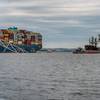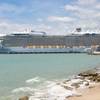Industry Asks IMO to Require Weighing of Containers
The International Maritime Organization (IMO) has received a formal proposal co-sponsored by a broad array of industry organizations, labor, and governments to require loaded containers to be weighed to determine their actual weight.
The proposal was submitted by Denmark, The Netherlands, the United States, BIMCO, the International Association of Ports and Harbors (IAPH), the International Chamber of Shipping (ICS), the International Transport Workers’ Federation (ITF), and the World Shipping Council (WSC). The IMO’s Subcommittee on Dangerous Goods, Solid Cargoes and Containers will consider the proposal at its next meeting in September.
“Misdeclared container weights are a recurring safety problem on shore, on ships, and on roadways. It is time to fix that problem. We are pleased that there is such a broad cross-section of industry and government agreement on a specific and effective remedy,” said Torben Skaanild, Secretary General of BIMCO.
“The cosponsors of this proposal are recommending a legal requirement that port terminal operators and ships must have a verified container weight in order to export a loaded container. This will protect workers in the port, on the ship, and other cargo owners against the various risks created by misdeclared containers,” said Peter Hinchliffe, Secretary General of ICS.
“The major players of the industry dealing with the handling of containers have chosen to make the transport of the "box" even safer than before. The ITF, representing more than 4.6 million workers, welcomes this initiative and will continue to work for a safe, productive and sustainable transport industry,” said Frank Leys, secretary of the ITF dockers’ section.
“For years, the United States has required all its export containers to be weighed. This has not impaired supply chain efficiency, and it has improved safety. The technology exists to weigh containers accurately and efficiently, and it should be a universal, required practice,” said Dr. Geraldine Knatz, president of IAPH and executive director of the Port of Los Angeles.
“The governments that have co-sponsored this proposal have been leaders at the IMO on the issue of maritime safety. Industry and labor are very pleased to have their support in the efforts to amend the Safety of Life at Sea (SOLAS) Convention and establish an effective solution to this safety issue,” said Christopher Koch, president and CEO of the World Shipping Council.
SOLAS currently requires the shipper (the cargo interest that loads its goods into the container) to provide an accurate container weight declaration, but this requirement is often not met, is not enforced by SOLAS parties, and there is no requirement to actually weigh a loaded container. To remedy the problem, the cosponsors propose a legal requirement, not only that the shipper provides an accurate weight declaration, but that the port facility and the ship have a weight verification certificate obtained by weighing the container. This will ensure that the actual weight of all loaded containers is received prior to stowing the container onto a vessel for export. The proposal and supporting paper is available at:
http://www.worldshipping.org/industry-issues/safety/IMO_DSC_17_submission_on_Container_Weighing_final.pdf
Additional information, including recent examples of incidents involving misdeclared container weights is available at: http://www.worldshipping.org/industry-issues/safety/cargo-weight
ABOUT THE INTERNATIONAL ASSOCIATION OF PORTS AND HARBORS (IAPH): IAPH is a global alliance of ports, representing some 230 ports in about 90 countries. Together, the IAPH member ports handle well over 60 percent of the world’s sea-borne trade and nearly 80 percent of the world’s container traffic. For more information about the International Association of Ports and Harbors, visit www.iaphworldports.org .
ABOUT BIMCO: BIMCO represents ship-owners controlling around 65 percent of the world’s tonnage, with members in more than 120 countries drawn from a broad range of stakeholders with an interest in the shipping industry that includes managers, brokers and agents. For more information about BIMCO, visit www.bimco.org .
ABOUT THE INTERNATIONAL CHAMBER OF SHIPPING (ICS): The International Chamber of Shipping is the representative body for the global shipping industry. Its member national shipowner associations operate about 80 percent of the world merchant fleet. For more information about the International Chamber of Shipping, visit www.ics-shipping.org .
ABOUT THE INTERNATIONAL TRANSPORT WORKERS’ FEDERATION (ITF): The International Transport Workers' Federation (ITF) is an international trade union federation of transport workers' unions. Any independent trade union with members in the transport industry is eligible for membership of the ITF. 690 unions representing over 4.6 million transport workers in 153 countries are members of the ITF. It is one of several Global Federation Unions allied with the International Trade Union Confederation (ITUC). www.itfglobal.org
ABOUT THE WORLD SHIPPING COUNCIL (WSC): The World Shipping Council is an association of liner shipping companies with offices in Brussels and Washington, D.C. Its members operate approximately 90 percent of the global liner ship capacity, providing more than 400 regularly scheduled services linking the continents of the world. Collectively, these services transport about 60 percent of the value of global seaborne trade, or more than US$ 4 trillion worth of goods annually. For more information about the World Shipping Council, visit www.worldshipping.org .











